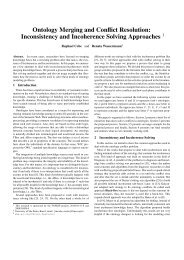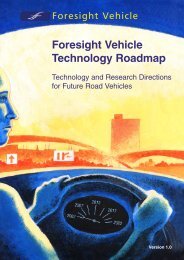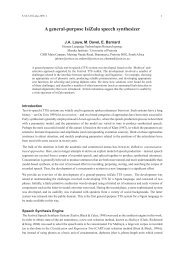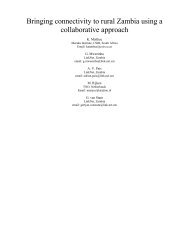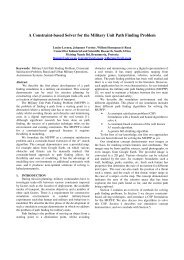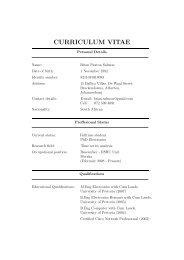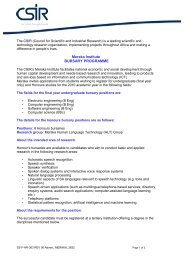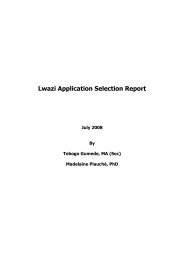Initial fieldwork for LWAZI: A telephone-based ... - Meraka Institute
Initial fieldwork for LWAZI: A telephone-based ... - Meraka Institute
Initial fieldwork for LWAZI: A telephone-based ... - Meraka Institute
Create successful ePaper yourself
Turn your PDF publications into a flip-book with our unique Google optimized e-Paper software.
once or twice a year. As we have previously<br />
mentioned, the lack of economic activity means<br />
that these communities depend heavily on<br />
government social grants. Older people in these<br />
communities are often unable to read and write.<br />
In some cases, their limited eyesight restricts<br />
their ability to use the cheaper “texting” feature<br />
of their mobile phones. In the communities we<br />
visited, ten out of the eleven official South<br />
African languages were spoken. Each<br />
community typically spoke two or more<br />
languages, not necessarily the historically<br />
dominant languages (Afrikaans and English). A<br />
<strong>LWAZI</strong> system that delivered in<strong>for</strong>mation about<br />
SASSA services would be more accessible to the<br />
older, rural population than current methods;<br />
however, it must support all eleven languages or<br />
at least a majority of them in order to be usable.<br />
4.3 Suitability of Technology<br />
The investigation prior to the design of<br />
the Lwazi system investigates how to ensure that<br />
the proposed system will be suitable to the<br />
lifestyle of the community to be served. We do<br />
know that currently, communities have other<br />
means of accessing government in<strong>for</strong>mation,<br />
including the free “Vukuzenzele” monthly<br />
magazine and local radio stations. Like these<br />
current means, Lwazi must be free in order to be<br />
effective and it must contain locally-relevant<br />
content in order to be useful to these poor<br />
communities. Government departments will find<br />
<strong>LWAZI</strong> to be a very useful and low-cost way of<br />
disseminating their in<strong>for</strong>mation. Rural South<br />
Africans will benefit from the alternative source<br />
of critical in<strong>for</strong>mation.<br />
Case study<br />
Sterkspruit is about 250 km from<br />
Bloemfontein in Eastern Cape province but<br />
near the border with the Free State province.<br />
This community is characterised by a high<br />
unemployment rate. However a majority of<br />
households have cell phones. Lwazi will be<br />
able to connect these communities to<br />
government departments. For example: in the<br />
Focused group discussion (FGD) we had with<br />
the CDWs, they mentioned that the<br />
communities they each serve are far apart from<br />
each other. They there<strong>for</strong>e are unable to<br />
service all of them as quickly and efficiently as<br />
they would like. They also mentioned that<br />
because some of the communities are located<br />
in mountains, it is thus extremely difficult to<br />
get transport to these areas. Consequently they<br />
need to walk. Because of this challenge, they<br />
sometimes find that there are a number of<br />
cases already waiting <strong>for</strong> them.<br />
This case study is another example of where<br />
Lwazi will be able to assist community<br />
members – a person could leave a message <strong>for</strong><br />
the CDW to visit them whenever the CDW is<br />
required.<br />
4.4 User Expertise<br />
The Lwazi system must also be usable to<br />
the target audience. We also sought to evaluate<br />
the expertise of potential Lwazi system users by<br />
gauging their current expertise with telephony<br />
and other ICT technologies. The user expertise<br />
of telephony systems differ between young and<br />
old. As mentioned earlier, households have at<br />
least one cell phone. The older members of the<br />
community use it to call and receive calls from<br />
friends and children away. They do not know<br />
how to send text messages. Some children have<br />
saved the full ‘Please call me’ line as a quick<br />
dial so that their elder family members can just<br />
press them in cases of emergency. The young<br />
people on the other hand are well versed with<br />
telephony technology. Most of them are also<br />
familiar with the basic use of a computer, despite<br />
their limited access to them. The Lwazi system<br />
must be as simple as making a phone call to a<br />
friend or relative in order to be accessible to all.<br />
In most household, however, there is someone<br />
who is technically competent. Based on our<br />
<strong>fieldwork</strong> and recent user studies of spoken<br />
dialog systems in developing regions (c.f.<br />
Sherwani et al., 2007; Shwarma et al.,<br />
submitted), a <strong>LWAZI</strong> system would be useable<br />
in the rural context of South Africa, even among<br />
the elderly and those who do not read and write.<br />
6




